A new genre of highly qualified education entrepreneurs are combining sports evangelism with enlightened capitalism, and are pulling out all stops to sell the concept of professionally delivered sports and fitness training to the country’s 1.30 million, particularly 80,000 private schools. Summiya Yasmeen reports
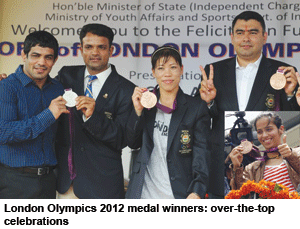 Although dressed up as India’s best ever Olympic games performance by frenzied media and a discredited government, in terms of medals tally (two silver and four bronze), this 1.2 billion strong nation ended up ingloriously at the bottom of the international league table not only below the US (104 including 46 gold) and China (88 and 38), South Korea (pop. 49 million, 28 and 13), but also below Jamaica (pop. 2 million, 12 and 4), Kenya (pop. 41 million, 11 and 2) and Ethiopia (pop. 84 million, 7 and 3).
Although dressed up as India’s best ever Olympic games performance by frenzied media and a discredited government, in terms of medals tally (two silver and four bronze), this 1.2 billion strong nation ended up ingloriously at the bottom of the international league table not only below the US (104 including 46 gold) and China (88 and 38), South Korea (pop. 49 million, 28 and 13), but also below Jamaica (pop. 2 million, 12 and 4), Kenya (pop. 41 million, 11 and 2) and Ethiopia (pop. 84 million, 7 and 3).
But even as the usual excuses — lack of funding and qualified coaches, dismal sports training infrastructure and the stranglehold of politicians over sports associations — were ritually trotted out simultaneously with over-the-top celebrations, the silver lining of the contretemps is the emergence of a national consensus that sports education and training has to be formally integrated into and dispensed in all of the country’s 1.30 million primary-secondary schools, 31,000 colleges and 611 universities. Perhaps for the first time, there is unanimity within the academic and educators’ community that a national sports culture and ecosystem which will produce world champions, has to be incorporated into the education system.
Fortuitously, this newly-emergent consensus in India coincides with the promotion and development of sports education companies with serious intent to target and sign up a growing number of schools. In the prevailing environ-ment in which physical education dispensed in schools is obsolete and half-hearted, a new genre of sports education entrepreneurs are combining sports evangelism with enlightened capitalism, and are pulling out all stops to sell the concept of professionally delivered sports training to the country’s 1.30 million schools, starting with 80,000 private schools. According to industry estimates, over ten sports education companies are currently delivering training to 260,000 students in 440 schools countrywide and are growing at 75 percent per year.
.gif) “Though physical education is an integral part of the curriculum of every school, it’s not given the priority it deserves nor is it delivered professi-onally. Most children dread joyless PE classes conducted by inadequately trained sports teachers. School sports curriculums are outdated, age inappr-opriate and non-inclusive. Schools need the help of qualified professionals to infuse their sports education progra-mmes with well-researched curriculums, joy and fun. If we get children in all schools to play regularly and improve their physical fitness, India will have a larger talent pool and our chances of international sporting success will improve dramatically. This is the best — though long route — solution for building a sports ecosystem which will generate Olympic medal winners,” says Saumil Majmudar, an alumnus of IIT-Bombay and IIM-Bangalore, and co-founder and chief executive of the Bangalore-based Edusports Pvt. Ltd, a pioneer sports education company which delivers sports services to 160,000 students in 220 schools countrywide on a per capita (Rs.100-150 per month) basis.
“Though physical education is an integral part of the curriculum of every school, it’s not given the priority it deserves nor is it delivered professi-onally. Most children dread joyless PE classes conducted by inadequately trained sports teachers. School sports curriculums are outdated, age inappr-opriate and non-inclusive. Schools need the help of qualified professionals to infuse their sports education progra-mmes with well-researched curriculums, joy and fun. If we get children in all schools to play regularly and improve their physical fitness, India will have a larger talent pool and our chances of international sporting success will improve dramatically. This is the best — though long route — solution for building a sports ecosystem which will generate Olympic medal winners,” says Saumil Majmudar, an alumnus of IIT-Bombay and IIM-Bangalore, and co-founder and chief executive of the Bangalore-based Edusports Pvt. Ltd, a pioneer sports education company which delivers sports services to 160,000 students in 220 schools countrywide on a per capita (Rs.100-150 per month) basis.
A serial entrepreneur (Learn@Home and QSupport) who played football at IIT-Bombay and represented Mahar-ashtra state in badminton nationals, Majmudar veered off the normative corporate track in 2003 to promote SportzVillage, a firm providing fitness, football and athletics training on a rented sports field in suburban Bangalore. Since then SportzVillage has morphed into SportzConsult (sports management) and EduSports Pvt. Ltd. Currently the Bangalore-based EduSp-orts offers its heavily researched fitness and sports education programmes through a massive contingent of 310 trained and certified instructors.
Edusports’ second annual Schools Sports & Fitness Study (2011) indicates that the overwhelming majority of school children countrywide are deprived of sports education. The survey which assessed the fitness and sports skills of 19,797 children aged seven-ten years in 73 schools in 31 cities, found that 61 percent of urban school-going children lack locomotor (running and hopping), manipulative (throwing and catching), non-manipulative (balancing), and spatial (awareness of self-space and boundaries) skills — the precondition for engagement with formal sports and games. Moreover, 43 percent suffer unhealthy body mass index, and 57 percent display poor motor flexibility. “Among a sub-group of 9,185 children who signed up for our fitness and sports education programme, there was marked improvement in body strength, athletic skills, body mass index and flexibility. It proves that scientifically researched fitness programmes can help children develop and participate in formal sports and lead healthy lives,” says Majmudar.
.gif) Several years later Dev Roy, an alumnus of R.V. College of Engineering, Bangalore with an MBA from the University of Chicago, also chucked up a high-flying corporate career in London and chose Bangalore as the head-quarters of FitKids Education and Training Pvt. Ltd. In December 2009 after “six months of intense research”, FitKids Education launched its Leapstart sports programme for K-XII schools.
Several years later Dev Roy, an alumnus of R.V. College of Engineering, Bangalore with an MBA from the University of Chicago, also chucked up a high-flying corporate career in London and chose Bangalore as the head-quarters of FitKids Education and Training Pvt. Ltd. In December 2009 after “six months of intense research”, FitKids Education launched its Leapstart sports programme for K-XII schools.
Developed in partnership with SPARK (Sports, Play and Active Recreation for Kids), a US-based research and public health organisation whose sports curriculum is being implemented in over 1,000 schools in 30 countries worldwide, Leapstart has been adapted for Indian conditions and focuses on developing children’s fitness and bodily-kinesthetic intelli-gence. Moreover Leapstart has also developed a sports specialisation programme for class III-VI students aspiring for excellence in athletics, basketball, cricket, football, swimming and tennis. Currently Leapstart progra-mmes are being implemented by 240 company trainers in 89 schools with an aggregate enrolment of 65,000 students in 15 cities countrywide (monthly per student fee: Rs.130-220).
“Leapstart is a series of age-appro-priate sports and physical education programmes which develop the inherent athletic skills of children. Unfortunately most school physical education programmes are undemanding and optional. Typically over 90 percent of children don’t participate in PE classes and there’s no assessment of children’s fitness and bodily-kinesthetic intelli-gence. That’s why we have adapted and integrated SPARK, the world’s most researched and field-tested physical fitness programme into Leapstart. All our 240 trainers compulsorily attend a eight-week annual training programme conducted by SPARK. Our policy is to sign full-school contracts so that all children participate, and every child is assessed for fitness and formal sports acumen and progress every month. We believe that sports training must begin in primary school as it’s the key to producing not only world class sports-persons who can compete globally but also for enabling success and wellness in life. I am certain that professionally administered sports education from primary school onwards will catalyse a sports and fitness revolution in India,” says Roy, co-founder and chairman of FitKids Education who began his career in IBM followed by stints in Bank of America, Dresdner Bank and served as the youngest managing director of Barclays Capital, London. However in 2009, he abruptly switched career tracks and returned to India to promote FitKids Education.
The trickle of highly qualified professionals with proven business management experience venturing into sports education could well become a flood. With at least four national television channels including the terrestrial Doordarshan Sports which reaches deep into rural India telecasting live action from sports arenas around the world, and making no secret of the huge fortunes being made by succes-sful sportspersons, mass interest has been kindled in sports of all kinds. Little wonder, a growing number of contem-porary sports stars are from small towns, and increasingly from rural India, a wholly new development. Besides, given India’s huge 1.2 billion population, of whom half is below 34 years of age, business opportunities in fitness and sports education and training — as also for sports equipment manufacturers and suppliers — are huge.
 And with EduSports and FitKids having signed up over 300 schools and 225,000 students within a short span of four years, businessmen beginning to revive the country’s entrepreneurial tradition are following suit. For instance, last year three new sports education companies got off the blocks — Kids Out Of Home (KOOH) Pvt. Ltd, Sportseed, and Tenvic.
And with EduSports and FitKids having signed up over 300 schools and 225,000 students within a short span of four years, businessmen beginning to revive the country’s entrepreneurial tradition are following suit. For instance, last year three new sports education companies got off the blocks — Kids Out Of Home (KOOH) Pvt. Ltd, Sportseed, and Tenvic.
According to Shrikant Hazare, the Mumbai-based chief marketing officer of KOOH (estb. 2011), there is rising demand from school managements ready to outsource their sports and physical education programmes to proven professionals. “We decided to enter the sports education space after an Indian Market Research Bureau survey across 394 schools and 120 colleges in eight cities commissioned by us, revealed that 70 percent of school and 75 percent of college managements are ready to outsource sports training,” says Hazare.
From the viewpoint of institutional managements, outsourcing sports education saves them hassles of administering sports programmes, offers the benefits of becoming associated with big names of the sporting world, while the per capita fee demanded by sports companies intent on reaping economies of scale, is modest. More-over the new genre of corporate sports providers are full-service companies.
For instance, KOOH offers its own structured sports curriculum, company certified trainers, all equipment and props required for delivery of its programmes, and a regular stream of student assessment reports, for which it demands a mere Rs.150-200 monthly per student. “Additionally under our BOM (Build-Operate-Maintain) model, we offer assistance to schools to construct excellent sports infrastructure and ensure it is maintained,” explains Hazare. Over the past 12 months, KOOH which boasts a galaxy of sports stars including former India test cricket captain Ajit Wadekar, former Delhi cricketer Sanjeev Sharma and former national basketball player John Chandy as advisors, has built a client base of nine schools and 14,000 students in nine cities countrywide.
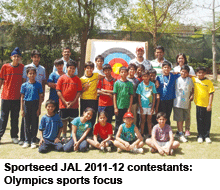 While the great majority of new genre sports education companies which are rocking K-12 education in particular, are full-service fitness and sports providers which respond to students/parents demand for specified sports and games training, a small minority focus on the provision of training in few or even one sports discipline.
While the great majority of new genre sports education companies which are rocking K-12 education in particular, are full-service fitness and sports providers which respond to students/parents demand for specified sports and games training, a small minority focus on the provision of training in few or even one sports discipline.
For instance, the Delhi-based Sportseed Pvt. Ltd, promoted last year by Sudanshu Fadnis, a former national-level badminton player, restricts itself to promoting Olympic sports (i.e. events contested in the Olympic Games) and values among school children. In a first-of-its-kind initiative, the company has established a Junior Archery League (JAL) with a membership of 40 schools in Delhi-NCR and offers intensive archery training and also organises an annual archery league tournament. In 2010-11, JAL attracted over 20,000 entries from 30 schools in Delhi-NCR.
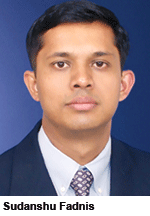 “The main objective of Sportseed is to train students in a few Olympic sports. The reason why India despite its 1.2 billion population won only six medals in the London Olympics, is that only 0.01 percent of the population plays Olympics sports. Archery is the first of the many Olympics sports we plan to introduce. JAL 2011-12 was a big success and now in JAL 2012-13, our goal is to get 100,000 children to participate,” says Fadnis, who quit a promising corporate career (KPMG, Ernst & Young) to promote Sportseed in 2011.
“The main objective of Sportseed is to train students in a few Olympic sports. The reason why India despite its 1.2 billion population won only six medals in the London Olympics, is that only 0.01 percent of the population plays Olympics sports. Archery is the first of the many Olympics sports we plan to introduce. JAL 2011-12 was a big success and now in JAL 2012-13, our goal is to get 100,000 children to participate,” says Fadnis, who quit a promising corporate career (KPMG, Ernst & Young) to promote Sportseed in 2011.
Even as a rapidly multiplying number of sports education entrepreneurs are gung-ho about the mind-boggling potential of the Indian market for their service packages, school (and college) managements — spared the hassles of recruiting sports teachers, purchasing equipment and administering extra-curricular activities — are rolling out the red carpet for them. “Preparing our students for Olympic sports is an excellent idea with a sense of purpose and direction. Signing up with Sportseed made perfect sense because they not only administer a professional curriculum, but also provide qualified coaches. Sportseed has made the best coaches available to us through the company’s tie-up with the Archery Association of India. We are now working with Sportseed to introduce a structured physical fitness and sports curriculum,” says Ashutosh Bhatta, director and principal of the CBSE-affiliated Bloom Public School, Vasant Kunj, Delhi.
Professionalisation of sports education, hitherto dispensed by minimally trained and paid physical education instructors, each dispensing his/her own interpretation of PE, is greatly appreciated by quality conscious private school managements. Comm-ents Dr. Bhavani Shankar, senior principal of the CBSE-affiliated Lalaji Memorial Omega International School, Chennai, which has partnered with EduSports to offer a structured sports curriculum to K-V students: “It’s painfully obvious that sports progra-mmes of most schools are under-developed, if not obselete. In contrast EduSports’ fitness and sports progra-mme is structured, well-researched and contemporary. It has brought rigour and discipline into our physical and sports education. Most importantly, it has helped us make sports education compulsory for all students. We are already beginning to see good results by way of reduced obesity, improved stamina and energy levels and less sports injuries among our students.”
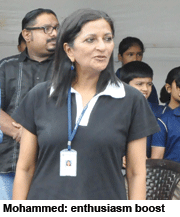 The advantages of substituting traditional in-house physical education with outsourced fitness and sports programmes administered by trained professionals or sports legends, are also appreciated by Shamim Moham-med, head (enrichment) of the CBSE/ CIE (UK)-affiliated Global Public School, Cochin (estb. 2005) which has signed up with Fitkids Education for its Leapstart programme followed by its 1,200 students. “Partnering with a profess-ional sports education company has saved the management a lot of time and effort which went into preparing and implementing the physical education programme. But with Leapstart delivering a comprehensive programme — structured sports curriculum, equipment, qualified trainers and regular student assessment reports — three years on, there’s been a huge improvement in terms of students’ enthusiasm for sports and fitness levels,” says Mohammed.
The advantages of substituting traditional in-house physical education with outsourced fitness and sports programmes administered by trained professionals or sports legends, are also appreciated by Shamim Moham-med, head (enrichment) of the CBSE/ CIE (UK)-affiliated Global Public School, Cochin (estb. 2005) which has signed up with Fitkids Education for its Leapstart programme followed by its 1,200 students. “Partnering with a profess-ional sports education company has saved the management a lot of time and effort which went into preparing and implementing the physical education programme. But with Leapstart delivering a comprehensive programme — structured sports curriculum, equipment, qualified trainers and regular student assessment reports — three years on, there’s been a huge improvement in terms of students’ enthusiasm for sports and fitness levels,” says Mohammed.
Debika Chatterjee, principal of JBCN International School, Mumbai is also a satisfied FitKids Education customer who has partnered with the Bangalore-based company to administer its Leapstart programmes to the school’s 800 K-class VII students. “The biggest benefit is that our sports programme has become fully inclusive with no child left behind. More schools should step forward and sign up with professional sports companies to upgrade their sports education programmes. It will create a generation of fitter and healthier children,” says Chatterjee.
.gif) Institutional managements apart, the debut of professionally managed sports corporates delivering contemporary fitness and sports training has also changed parental attitudes and mindsets hitherto focused on academic proficiency. With child obesity levels rising in metropolitan India, parents are becoming incrementally apprec-iative of fitness and sports education. “There’s a big change in the way schools and parents are beginning to regard sports education. Parents are also demanding more from school sports programmes. It’s now about all children growing up with some sports proficiency and fitness. In the circumstances schools have to look for professional sports companies to deliver value to students and parents. This is also an opportunity for school managements to free themselves of sports education and focus on academics,” says Martin Gleeson, a highly-experienced Cricket Australia- accredited coach who worked with Cricket Victoria and International Cricket Council before being appointed chief executive officer of the Mumbai-based Sports Education Development India Ltd (estb. 2009).
Institutional managements apart, the debut of professionally managed sports corporates delivering contemporary fitness and sports training has also changed parental attitudes and mindsets hitherto focused on academic proficiency. With child obesity levels rising in metropolitan India, parents are becoming incrementally apprec-iative of fitness and sports education. “There’s a big change in the way schools and parents are beginning to regard sports education. Parents are also demanding more from school sports programmes. It’s now about all children growing up with some sports proficiency and fitness. In the circumstances schools have to look for professional sports companies to deliver value to students and parents. This is also an opportunity for school managements to free themselves of sports education and focus on academics,” says Martin Gleeson, a highly-experienced Cricket Australia- accredited coach who worked with Cricket Victoria and International Cricket Council before being appointed chief executive officer of the Mumbai-based Sports Education Development India Ltd (estb. 2009).
A joint venture of the Kohinoor Group and Podar Enterprises, SEDIL has exclusive delivery rights in India of Cricket Australia’s Cricket Education Program (CEP), a six-level curriculum-based training programme for nine-14 year olds. Currently SEDIL’s Cricket India Academy has nine centres in Mumbai and Pune and three in Jaipur, with 1,500 children enroled in them.
But though an increasing number of enlightened private school managements are rolling out the red carpet for new genre profess-ional sports education service providers, the great majority within the country’s academic and parental communities continues to regard sports as academically distra-cting indulgence. This dismissive attitude towards games and sports — as important a subject as any other — is compounded by an acute shortage of playgrounds and sports infrastructure in education institutions.
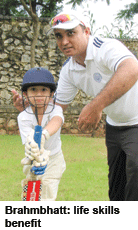 Deepak Brahmbhatt, founder of Mumbai-based Sportz Planet which offers cricket, hockey, football, volley-ball, table tennis, and basketball coac-hing programmes to schools, laments that with active parental connivance, school managements focus excessively on academics. “It’s a tough job persu-ading them that sports is as integral to education as science and humanities. It teaches children important life skills such as decision-making, leadership, team work and most importantly, instills the value of fitness and healthy lifestyles in them. All exam boards must make sports a compulsory subject and government should build public sports infrastructure,” says Brahmbatt.
Deepak Brahmbhatt, founder of Mumbai-based Sportz Planet which offers cricket, hockey, football, volley-ball, table tennis, and basketball coac-hing programmes to schools, laments that with active parental connivance, school managements focus excessively on academics. “It’s a tough job persu-ading them that sports is as integral to education as science and humanities. It teaches children important life skills such as decision-making, leadership, team work and most importantly, instills the value of fitness and healthy lifestyles in them. All exam boards must make sports a compulsory subject and government should build public sports infrastructure,” says Brahmbatt.
Jay Shah, founder-managing director of Sports Gurukul (estb.2002), Mumbai, which offers sports development programmes for schools and colleges, suggests a national campaign to educate parents and teachers about the importance of integrating sports into school curric-ulums. “Education of parents and academic communities is essential for generating respect for sports education and achievement. Society needs to be made aware that schools are under obligation to teach children the impor-tance of physical fitness and healthy lifestyles which determine national productivity. If we begin at the grass-roots, we will have a larger pool of sportspersons and nurture a national sports culture,” says Shah.
Against this backdrop, a promising Central government initiative which is likely to give a big boost to integration of sports into school education was the release on August 30 of a draft of the National Physical Fitness Programme by Union minister of youth affairs and sports Ajay Maken. The outcome of a Marks for Sports campaign spear-headed by the Delhi-based NDTV Television, the programme proposes to award marks for sports and fitness in K-12 schools. Under the draft proposal now open for public debate, the top 10 percent of sports achievers will be awarded additional 3 percent marks, those in the next decile will get 2.5 percent, and those in the 20-30, 30-40 and 40-50 performance brackets will get an additional 2, 1.5 and 1 percent respectively. Students will be evaluated on six parameters — cardio respiratory endurance, muscular strength, endur-ance, flexibility, explosive strength and body composition. Fitness cards and forms are being prepared by the Lakshmibai National University for Physical Fitness, Gwalior.
There’s no denying that sustained promotion of the proven benefits of physical and sports education in the country’s 1.30 million (including 1.10 million government) schools, and 31,000 colleges, as well as education of academic and parent communities, is the precondition of India emerging as a healthy, high-performing sports nation. New genre professional sports education companies promoted by highly-qualified entrepreneurs, are showing the way to integrate struc-tured sports training in school and college education curriculums. This development will undoubtedly result in children improving fitness levels and developing the skills required for top-level international competitive sports and games to produce Olympic medal winners.
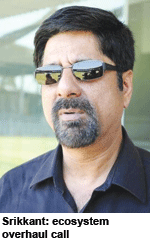 “As a nation we give minimal importance to sports education with most teachers and parents actually discouraging children from playing. Shortages of playing fields, sports infrastructure, funds and sponsorships are a natural outcome as is India’s poor record in most games and sports played internationally. The entire sports eco-system has to be radically improved for India to emerge as a high-performing sports nation. The emergence of professionally managed companies taking the lead to integrate structured sports programmes into school educ-ation systems is a positive develop-ment. But if we are to produce world champions and Olympic medalists, their efforts need to be supplemented with excellent training and infrastructure, and sustained, professionally administered coaching in post secondary education,” says Krishnamachari Srikkant, former India cricket captain and hitherto chairman of the selection committee of the Board of Control for Cricket in India (BCCI), who has also launched three internet portals (carrerstrokes.com, edustrokes.com and cricketstrokes.com) to improve learning outcomes through sport.
“As a nation we give minimal importance to sports education with most teachers and parents actually discouraging children from playing. Shortages of playing fields, sports infrastructure, funds and sponsorships are a natural outcome as is India’s poor record in most games and sports played internationally. The entire sports eco-system has to be radically improved for India to emerge as a high-performing sports nation. The emergence of professionally managed companies taking the lead to integrate structured sports programmes into school educ-ation systems is a positive develop-ment. But if we are to produce world champions and Olympic medalists, their efforts need to be supplemented with excellent training and infrastructure, and sustained, professionally administered coaching in post secondary education,” says Krishnamachari Srikkant, former India cricket captain and hitherto chairman of the selection committee of the Board of Control for Cricket in India (BCCI), who has also launched three internet portals (carrerstrokes.com, edustrokes.com and cricketstrokes.com) to improve learning outcomes through sport.
The silver lining of India’s embar-rassing bottom-of-the-heap performance at the London Olympic Games 2012, is that it has focused national attention on the vital importance of high-quality physical and sports education being made available on mass scale from early childhood. Responding to this chall-enge, new genre sports education companies are readying to deliver professionally administered sports education at affordable prices in India’s schools and colleges. The natural outcome will be a healthier, fitter and productive population which will not only start winning medals and encomiums in Olympic and other sports arenas, but in the nation’s farms and factories as well.
With Swati Roy (Delhi); Praveer Sinha (Mumbai) & Hemalatha Raghupathi (Chennai)